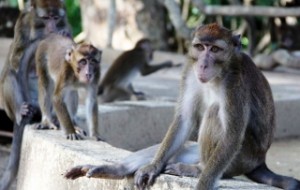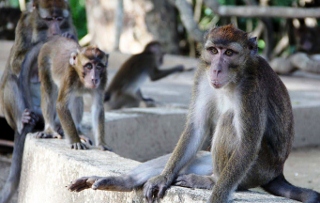 When in Subic, keep in mind not to feed the monkeys. This is the warning given by the Subic Bay Metropolitan Authority (SBMA) to visitors and residents alike, as it recently issued a policy strictly prohibiting the feeding of monkeys and other wild animals in pursuance of the agency’s wildlife conservation program.
When in Subic, keep in mind not to feed the monkeys. This is the warning given by the Subic Bay Metropolitan Authority (SBMA) to visitors and residents alike, as it recently issued a policy strictly prohibiting the feeding of monkeys and other wild animals in pursuance of the agency’s wildlife conservation program.
“Feeding the monkeys is not doing the monkeys a favor,” SBMA chairman and administrator Roberto V. Garcia stressed, as he announced the policy approved by the agency’s board of directors.
“In fact, feeding them teaches them bad habits like stealing food and, more importantly, it creates a dangerous dependency that diminishes the survival abilities of these animals,” Garcia explained.
“You would actually be doing the monkeys harm when you give them food,” he added.
Garcia said the SBMA enacted the policy, firstly, to conserve wildlife in the Subic Bay Freeport pursuant to the Subic Bay Protected Area Management Plan (SBPAMP) and in accordance with the Philippine Wildlife Conservation Act.
Secondly, the policy is also meant to protect the public from harm because there have been cases when residents and visitors in the Freeport were bitten by monkeys, he added.
According to the SBMA Ecology Center, the long-tailed macaque (Macaca fascicularis philippensis), which also known as the crab-eating macaque or cymologous monkey,can be found all throughout the Subic Watershed and Forest Reserve.
A population survey made in 2010 indicated that there were around 11 individual macaques within a square kilometer of Subic forests. The monkeys preferred to live in forest areas near water sources, but with rapid urban development in the free port, they have increasingly gravitated to housing and commercial areas where they find food.
Local conservationists, however, pointed out that with this development, the monkeys have begun to scavenge for scraps of food from garbage bins instead of feeding on wild fruits and tubers, seeds, insects and small animals.
Lilia Alcazar, head of the Ecology Center’s Protected Area Management Division, warned that the availability of food from humans has altered the feeding habits of monkeys and may ultimately cause their extinction.
“Monkeys are wild animals and should not be made dependent on human food. It is their nature to hunt and travel long distances in search for food. Like humans, without physical activity they will become weak and may not be able to face the rigors of wildlife,” Alcazar explained.
Garcia said the policy prohibiting the feeding of wild monkeys and other wild animals here would be enforced strictly, with members of the SBMA Law Enforcement Department conducting patrols of areas where monkey-human encounters are common.
Meanwhile, the Ecology Center would undertake measures to educate the public about this policy, disseminate information about monkeys and other Subic wildlife, and promote safety precautions in encounters with Subic wildlife.








Leave a Reply